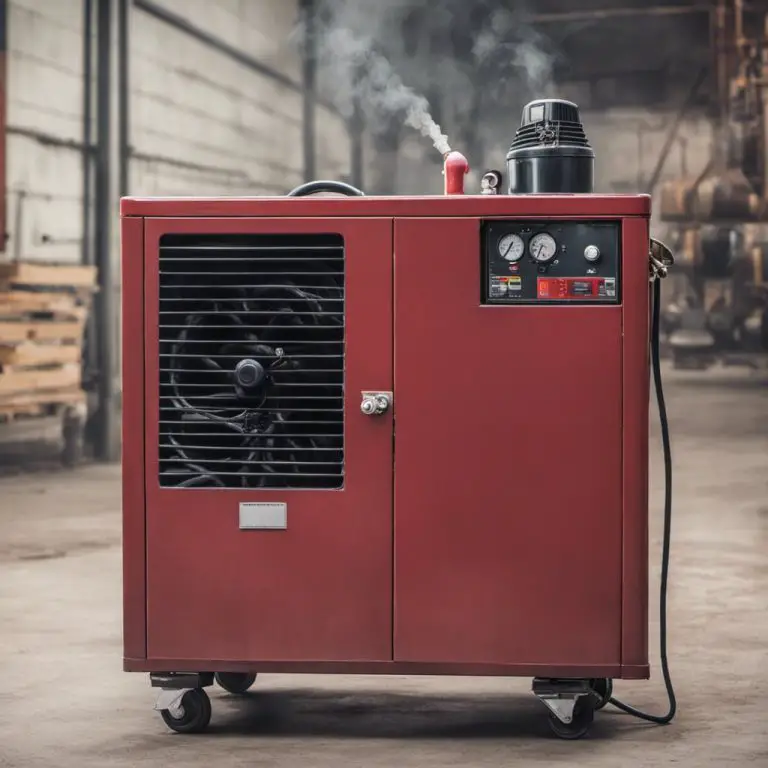When an air compressor starts smoking, it can be a cause for concern. Not only is it a sign that something is wrong with the compressor, but it can also be a safety hazard. There are a few different reasons why an air compressor may start smoking, and it’s important to identify the cause so that it can be addressed and resolved.
One of the most common reasons for an air compressor to start smoking is due to low oil levels. When the oil level is too low, it can cause the compressor to overheat and start smoking. Checking the oil sight glass is the quickest way to determine if the compressor is smoking due to oil shortage. If the oil level seems normal, it’s important to confirm the last time the compressor was taken for maintenance to know if there is a need for an oil change.
Understanding Air Compressors
An air compressor is a machine that converts power into potential energy stored in pressurized air. This compressed air can be used in various applications, such as powering pneumatic tools, inflating tires, and even in industrial processes.
Air compressors come in different types, sizes, and capacities. The most common types are reciprocating, rotary screw, and centrifugal compressors. Reciprocating compressors use pistons to compress air, while rotary screw compressors use screws to do the same job. Centrifugal compressors use impellers to accelerate and compress air.
Air compressors also require proper maintenance to ensure their longevity and efficiency. This includes regular oil changes, air filter replacements, and cleaning of the compressor tank. Neglecting maintenance can lead to various problems, such as overheating, smoking, and even failure of the compressor.
When selecting an air compressor, it is important to consider the intended use, required pressure and flow rate, and the available power source. It is also important to choose a compressor with a capacity that exceeds the required output to prevent overworking the machine.
Overall, understanding the basics of air compressors is crucial in selecting, operating, and maintaining the machine.
Common Causes of Air Compressor Smoking
When an air compressor starts smoking, it can be a cause for concern. In this section, we will discuss the common causes of air compressor smoking.
Overheating
One of the most common causes of air compressor smoking is overheating. Overheating can occur due to a variety of reasons, including low oil levels, blocked air intakes, or incorrect power supply. When an air compressor overheats, it can start smoking and even catch fire. It is important to address the issue immediately to prevent further damage.
Lack of Maintenance
Another common cause of air compressor smoking is a lack of maintenance. Regular maintenance is essential to keep your air compressor in good working condition. Failure to perform routine maintenance can lead to problems such as overheating, low oil levels, and blocked air intakes, which can cause smoking.
Blocked Air Intake
A blocked air intake is another common cause of air compressor smoking. When the air intake is blocked, the compressor has to work harder to draw in air, which can cause it to overheat. Blocked air intakes can occur due to a variety of reasons, including dust, debris, and dirt. Regular cleaning of the air intake can help prevent this issue.
Incorrect Power Supply
Using the incorrect power supply can also cause air compressor smoking. If the power supply is too low, the compressor may not be able to function properly, causing it to overheat and smoke. It is important to use the correct power supply for your air compressor to prevent this issue.
In summary, air compressor smoking can be caused by a variety of factors, including overheating, lack of maintenance, blocked air intake, and incorrect power supply. It is important to address the issue immediately to prevent further damage. Regular maintenance and cleaning can help prevent these issues from occurring.
Signs of a Smoking Air Compressor
A smoking air compressor is a clear indication that something is wrong with the machine. Signs of a smoking air compressor may include black or gray smoke, a burning smell, and unusual noises. Overheating, oil leaks, and worn-out components are the most common causes.
One of the first signs of a smoking air compressor is black or gray smoke coming from the machine. This can be caused by a variety of issues, including overheating, worn-out components, or oil leaks. If the smoke is accompanied by a burning smell, it is likely that the machine is overheating.
Another sign of a smoking air compressor is unusual noises. If the machine is making a grinding, squeaking, or rattling sound, it may be due to worn-out components or a malfunctioning cooling system.
Oil leaks are another common cause of a smoking air compressor. If there is oil leaking from the machine, it can cause smoke and a burning smell. Checking the oil sight glass is the quickest way to know if the air compressor is smoking due to oil shortage. If the oil level seems normal, it is important to confirm the last time the air compressor was taken for maintenance to know if there is a need for an oil change.
In summary, a smoking air compressor is a clear indication that something is wrong with the machine. Signs of a smoking air compressor may include black or gray smoke, a burning smell, and unusual noises. Overheating, oil leaks, and worn-out components are the most common causes. Checking the machine regularly and performing maintenance as needed can help prevent these issues from occurring.
Preventing Air Compressor Smoking
To prevent air compressor smoking, it is essential to follow proper maintenance procedures, installation guidelines, and usage instructions. This section will discuss some key factors to consider when preventing air compressor smoking.
Regular Maintenance
Regular maintenance is critical to prevent air compressor smoking. It ensures that the compressor is running efficiently and reduces the risk of overheating or mechanical failure. Here are some maintenance tips to follow:
- Check the oil level regularly and change it as needed.
- Clean or replace air filters to prevent clogs and reduce strain on the compressor.
- Inspect belts and hoses for signs of wear and replace them as needed.
- Lubricate moving parts to reduce friction and wear.
- Check for leaks and repair them promptly.
Proper Installation
Proper installation is crucial to prevent air compressor smoking. Incorrect installation can cause overheating, leaks, or other issues that can lead to smoking. Here are some installation guidelines to follow:
- Choose a location that is well-ventilated and free from obstructions.
- Ensure that the compressor is level and stable.
- Use the correct size and type of power supply.
- Install the compressor according to the manufacturer’s instructions.
- Use the correct type of oil and follow the recommended oil change schedule.
Correct Usage
Correct usage is also essential to prevent air compressor smoking. Misuse or abuse of the compressor can cause overheating, mechanical failure, or other issues that can lead to smoking. Here are some usage tips to follow:
- Do not exceed the recommended duty cycle.
- Do not use the compressor for applications it is not designed for.
- Do not run the compressor without proper ventilation.
- Do not operate the compressor in extreme temperatures.
- Do not overload the compressor beyond its capacity.
By following these maintenance, installation, and usage guidelines, you can help prevent air compressor smoking and ensure that your compressor runs smoothly and efficiently.
When to Seek Professional Help
While there are some simple fixes for an air compressor that is smoking, it is important to know when to seek professional help. Here are some situations where it is best to call in an expert:
- Electrical Issues: If your air compressor is smoking due to electrical problems, it is best to call in a professional electrician. Attempting to fix electrical problems on your own can be dangerous and may result in further damage to your air compressor or even injury to yourself.
- Refrigerant Leaks: If your air compressor is smoking due to a refrigerant leak, it is important to have the leak repaired by a certified technician before adding more refrigerants to the system. Adding more refrigerant without fixing the leak can cause further damage to your air compressor and may even be harmful to the environment.
- Mechanical Failures: If your air compressor is smoking due to mechanical failures, it is best to call in a professional mechanic. Attempting to fix mechanical problems on your own can be difficult and may result in further damage to your air compressor.
- Overheating: If your air compressor is smoking due to overheating, it is important to turn off the compressor and allow it to cool down before attempting any repairs. If the problem persists, it is best to call in a professional to diagnose and fix the issue.
In general, if you are unsure of how to fix the problem or feel uncomfortable attempting repairs on your own, it is best to call in a professional. They have the knowledge and experience necessary to diagnose and fix the issue safely and efficiently.
Conclusion
In conclusion, a smoking air compressor is a serious issue that requires immediate attention. It can be caused by various factors such as oil shortage, overheating, damaged seals, or worn-out piston rings.
To resolve the issue, it is important to first turn off the air compressor and inspect it for visible signs of damage such as burnt wires, leakage, or damaged parts. Checking the oil sight glass can also help determine if the oil level has dropped too low. If the oil level seems normal, it is recommended to confirm the last time the air compressor was maintained to know if there is a need for an oil change.
If the issue persists, it is best to seek the help of a professional technician who can diagnose and repair the problem. Regular maintenance and inspection of the air compressor can also help prevent such issues from occurring in the future.
Overall, it is important to take the necessary precautions and address the issue promptly to prevent further damage and ensure the safe and efficient operation of the air compressor.


